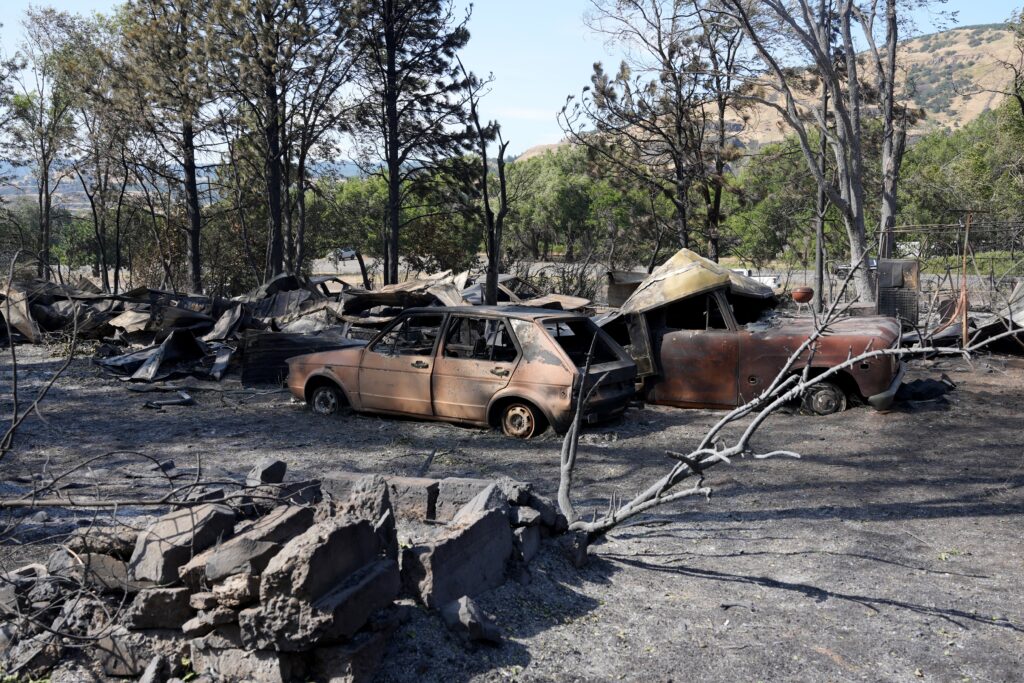Two Democratic lawmakers
unveiled a proposal
Tuesday to pay for wildfire mitigation using a tax on oral nicotine products and some of the interest on Oregon’s rainy day savings account.
The proposal aims to raise about $60
million during the coming two years budget for wildfire mitigation.
That’s far short of the total of
$280 million benchmark
that a group of three dozen stakeholders said lawmakers needed to come up with every biennium to adequately pay for fire prevention and mitigation. About $150 million of that request was to pay for fighting wildfires, while the remaining $130 million was aimed at wildfire prevention and readiness.
The new proposal was unveiled as an amendment to House Bill 3940 and is scheduled for a hearing Wednesday.
Rep. Pam Marsh, an Ashland Democrat who worked on the proposal with Democratic Sen. Anthony Broadman of Bend, said the pair wanted to carve out funds for fire mitigation as lawmakers continue to finalize details about a broader wildfire package. Though $60 million for mitigation is less than half the $130 million the work group had hoped for, Broadman said it was reflective of the “budget reality we’re living in right now.”
“We are marking a stake,” Marsh said. “We’re dedicating some revenues to this work – not as much revenue as we need – but we are doing what we can.”
“We save money on (fire) suppression for every dollar we spend on preparing and having a fire resilient landscape,” Broadman said.
The pair’s proposal will need to receive at least three-fifths approval in each chamber to pass. Democrats have just that number of seats in each, and not every Democrat makes it to Salem every day.
Marsh said she’s expecting additional money to be designated for wildfire suppression before lawmakers leave Salem.
The original version
of House Bill 3940 included four funding proposals offered by a diverse group of ranchers, environmentalists, timber representatives and firefighters tasked with coming up with a sustainable plan to pay for wildfires. Those included diverting money from state reserves and the general fund and instituting a new tax on bottles and cans. Some of those ideas hit snags: While Democrats disliked the idea of using existing state money to pay for wildfire, other Democrats and environmentalists were staunchly opposed to changing Oregon’s landmark bottle bill to fund wildfire.
Marsh’s and Broadman’s proposal nixes those ideas. The bottle and can tax is gone, as is the idea of using an insurance tax that flows into the general fund.
Instead it proposes a consumer tax on oral nicotine products, such as ZYN pouches, of 65 cents on a package with 20 or fewer pouches and 3 cents per pouch in packages with
more than 20 products. Marsh and Broadman say they hope that would raise at least $30 million per biennium in perpetuity for wildfire prevention work.
The bill would also transfer roughly 20% of the interest generated by the Oregon Rainy Day Fund to pay for landscape resiliency and community risk reduction. Marsh and Broadman say the goal is to find an additional $30 million per biennium. But Marsh said she doesn’t think the interest will be permanently committed to wildfire.
Legislative budget writers signaled earlier in the session that they intend to set aside $150 million for natural disasters in the coming two years, money that could be used for wildfire suppression as well as other needs such as responses to floods or ice storms.
The wildfire work group was hoping for at least $150 million in dedicated fire revenue per biennium to cover the five-year rolling average cost of wildfires, which has surged after a record-breaking 2024 wildfire season.
Gov. Tina Kotek
told reporters on Monday
that she didn’t think lawmakers had hit upon a sustainable and long-term funding solution for wildfire this session. She urged them to find as much one-time funding as possible.
Marsh echoed that sentiment.
“Do I think we’re going to come up with a new source of funding for $280 million at this point in the session? No,” she said. “But I do think we’re doing everything we can to pick off the most important and most vulnerable part of the package, which is mitigation.”
Two additional funding ideas are still circulating in other bills:
Sen. Fred Girod, a Silverton Republican, has proposed diverting lottery proceeds to pay for wildfire. Girod aims to do so through a constitutional amendment on the ballot in 2026. He did not immediately respond to a message on Tuesday about whether he still intends to pursue that.
And Ashland Democratic Sen. Jeff Golden told colleagues on Tuesday morning that he’s still fighting for his proposal to divert part of the state’s anticipated $1.6 billion personal income tax “kicker” rebate, which taxpayers are slated to claim when they file their 2025 taxes early next year, into a savings account to pay for wildfire on an ongoing basis. Golden’s plan is to return some or all of the kicker rebate to Oregonians who make less than $95,000 a year and direct about $1 billion into a permanent trust fund that could generate $100 million every biennium for wildfire.
That vote would require a two-thirds majority of lawmakers, meaning that Golden would have to convince at least some Republicans to support that plan. Kotek told reporters that she didn’t think Golden would have the votes to do so.
Golden said in a speech on the House floor Tuesday that some people have said he’s “tilting at windmills” by trying for a vote to divert the kicker. But, “some windmills are worth tilting at,” he said.
“Is there another single vote that could give Oregonians a gift as important and long-lasting as this?
I can’t think of one,” Golden told his colleagues. “We have one chance and probably only one, right now, to give this gift, if we rise above politics as usual.”
Golden’s bill and Girod’s are both still alive in the Senate Revenue Committee, though neither have been scheduled for a vote.
Marsh and Broadman’s proposal would also make some policy changes that landowners and state fire agencies say are crucial, including lowering fire protection fees for ranchers and allowing the state treasury to loan money to the Oregon Department of Forestry and Department of the State Fire Marshal, which often have to front major fire fighting costs while they wait for state and federal reimbursement.
It also would add a home hardening program that Marsh says was “the one piece of our mitigation lineup that’s been missing.” The program would give grants to people to retrofit their homes with wildfire resistant materials.
The plan to pay for home hardening and wildfire mitigation has been a key sticking point holding up a vote on Senate Bill 83, a measure that would repeal highly controversial property-specific wildfire hazard maps. Those maps included some home hardening requirements for homeowners in vulnerable areas – but they caused pushback from rural landowners and lawmakers who represent them, who argued that the maps penalized or might penalize homeowners based on a flawed analysis of risk.
Democrats held up a vote on Senate Bill 83 last month, rankling Republicans who had shouted for the map’s repeal. Republicans accused Democrats of holding the maps hostage in exchange for their support of wildfire funding.
House Speaker Julie Fahey denied that but said she didn’t want to repeal the home hardening requirements without some kind of funding for fire prevention.
“You can’t take something away without a plan for what’s replacing it,” she said.
Marsh, who on the committee that
delayed the wildfire map repeal
last month, said she expects Senate Bill 83 will move forward soon.
She and several other Democrats joined House Republicans on Tuesday in an attempt to force that map out of committee and onto a vote of the full House. It failed by a handful of votes.
A spokesperson for Fahey did not immediately respond to a request for comment on the House speaker’s plan for the bill.
Sami Edge covers higher education and politics for The Oregonian. You can reach her at
sedge@oregonian.com
or (503) 260-3430.
Latest local politics stories
-
‘Take what I can get’: Kotek signals long-term wildfire funding solution unlikely in 2025
-
Voters increasingly skeptical that Portland-area homeless services tax is working, poll shows
-
New Oregon law is supposed to help sex-trafficked women living in massage parlors, but will it?
-
Portland ‘does not require’ National Guard intervention after protests, mayor says
-
Crying in the Oregon Legislature: Lawmakers keep breaking into tears, unheard of a generation ago





More Stories
Lawmakers unveil a plan aimed at generating $60 million for wildfire prevention
Lawmakers unveil a plan aimed at generating $60 million for wildfire prevention
Lawmakers unveil a plan aimed at generating $60 million for wildfire prevention